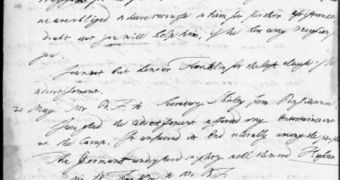Shuffling through old papers in the British Library, University of California in San Diego (UCSD) Professor of Political Sciences Alan Houston stumbled upon documents that hadn't seen the light of day for more than 250 years – a lost letter trove belonging to Benjamin Franklin. The collection of 47 letters, all dating back to the spring and summer of 1775, were found in the Copies of Letters relating to the March of General Braddock, a work authored by Thomas Birch. The author was a compiler and transcriber of historical documents, and he faithfully copied these letters, which were either written by or for Franklin, or even about him.
The entire collection is scheduled to be published in the April issue of the journal William and Mary Quarterly. They detail Franklin's involvement in the first phase of the French and Indian War, namely his interactions with General Edward Braddock. Houston, who was in England researching his latest book, Benjamin Franklin and the Politics of Improvement (Yale University Press, 2008), made the find in the last day of his stay on the island. He had planned to meet up with some friends, but decided to go for a final round of research instead.
Houston shared that the part of Birch's handiwork that was stored at the British Library numbered a whooping 400 volumes, and that the innocently titled book he requested showed no hints as to its contents. “It's late, but I'll take a quick glance before I leave,” he reported as saying when finally getting to Birch's transcripts. “I knew almost instantly what I was looking at. Franklin refers to a book of letters concerning the 'wagon affair' in his 'Autobiography,' but no one has ever seen it. Like others, I assumed that it had had not survived,” the political-thought expert added. “This was a find of a different order of magnitude, the kind that happens only once in a lifetime.”
“It is one thing to find a single letter, but to find a whole conversation is stunning. It's a really great story, that a diligent scholar who knows what he's looking at can find what nobody saw,” University of Nevada Professor of American History Scott Casper, who is also the visiting editor of the William and Mary Quarterly, shared. “Finally, the sheer existence of these letters, sitting quietly on the shelves of the British Library for nearly 250 years, poses a tantalizing question. Franklin spent 18 years – more than 20 percent of his life – in the United Kingdom. How many other treasures await to be found?” Houston asked.
According to the researchers, the letter trove also sheds some light on the events of the time, and especially on the march that General Braddock led through Pennsylvania. The idyllic image of the war in which the French and the Indian were also involved has been somewhat shattered, as the newly found documents contradict some of the data that Franklin himself wrote in his Autobiography. “This is not only important to Ben Franklin scholarship, but also illuminates an important part of American history,” Casper concluded.

 14 DAY TRIAL //
14 DAY TRIAL //